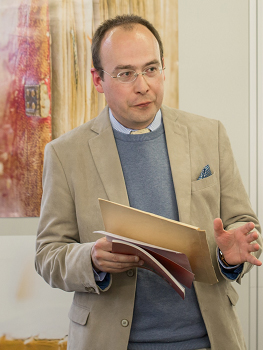Selected Publications
- Mechthild von Magdeburg: „Lux divinitatis“ – „Das liecht der gotheit“. Der lateinisch-frühneuhochdeutsche Überlieferungszweig des ‚Fließenden Lichts der Gottheit’. Synoptische Ausgabe, hg. von B. J. N und Elke Senne unter Leitung von Ernst Hellgardt, Berlin 2019. Link.
- Mechthild und das „Fließende Licht der Gottheit“ im Kontext. Eine Spurensuche in religiösen Netzwerken und literarischen Diskursen im mitteldeutschen Raum des 13.–15. Jahrhunderts, hg. von Caroline Emmelius und Balázs J. Nemes, Berlin: Erich Schmidt 2019 (ZfdPh, Beiheft 17). Link.
- Trampelpfade historischer Textdeutung. Die mittelalterliche Überlieferung und ihre spatialen Ordnungen, in: De l'(id)entité textuelle au cours du Moyen Âge tardif (XIIIe-XVe siècle), s.d. Barbara Fleith, Réjane Gay-Canton et Géraldine Veysseyre, en coll. avec Aude Mairey, Paris: Classiques Garnier 2017 (Coll. Rencontres Nr. 304, Ser. Civilisation médiévale Nr. 27), 295–322.
- Das lyrische Œuvre von Heinrich Laufenberg in der Überlieferung des 15. Jahrhunderts. Untersuchungen und Editionen, Stuttgart: Hirzel 2015 (ZfdA, Beiheft 22).
- Der involvierte Leser. Immersive Lektürepraktiken in der spätmittelalterlichen Mystik-Rezeption, in: Immersion im Mittelalter. Unter Mitarbeit von Susanne Kaplan hg. von Hartmut Bleumer, Stuttgart, Weimar: Metzler 2012 (LiLi 42/167, 2012), 38–62.
- Von der Schrift zum Buch – vom Ich zum Autor. Zur Text- und Autorkonstitution in Überlieferung und Rezeption des ›Fließenden Lichts der Gottheit‹ Mechthilds von Magdeburg, Tübingen: Narr/Francke/Attempto 2010 (Bibliotheca Germanica 55).
FRIAS Project
The theologia mystica as “Literature of Experts”. The experti and Their Works in the Reading and Compilation Practice of the Erfurt Carthusian frater N.
What is mysticism? The standard dictionary definition is cognitio Dei experimentalis: the cognition of God grounded in personal experience. Just as in the medieval discussion concerning the weighting of experience and cognition in the vision of God – the goal of so-called mystical theology (theologia mystica) – so too the modern-day, interdisciplinary debate around the concept of mysticism concerns the definition of that relationship between direct experience and subsequent reflection upon it. The judgement reached by an Erfurt Carthusian known as Brother N. (frater N.) in the 1480s upon Jean Gerson (d. 1429), one of the leading theologians of the fifteenth century, is thus all the more interesting: for him Gerson was unqualified (inexpertus) with regard to mystical theology. That judgement is supported with evidence drawn from the style and content of Gerson’s writings on theologia mystica, marshalled to allege that Gerson had no knowledge from personal experience of what he wrote. He reproached Gerson by drawing upon Latin and German (!) works whose authors Brother N. claimed were experienced (experti) in the vision of God. In my project I want not just to edit the relevant textual material, but also to investigate the semantics, the status, and the function of experience in Brother N.’s works regarding the ‘expert literature’, and to provide a contribution to the historicization of the concept of mysticism centered around an illustrative case-study.
